外研版(2019) 选择性必修 第四册 Unit 1 Looking forwards Using language课件(共64张PPT)
文档属性
| 名称 | 外研版(2019) 选择性必修 第四册 Unit 1 Looking forwards Using language课件(共64张PPT) |  | |
| 格式 | zip | ||
| 文件大小 | 24.6MB | ||
| 资源类型 | 教案 | ||
| 版本资源 | 外研版(2019) | ||
| 科目 | 英语 | ||
| 更新时间 | 2023-03-26 17:45:32 | ||
图片预览


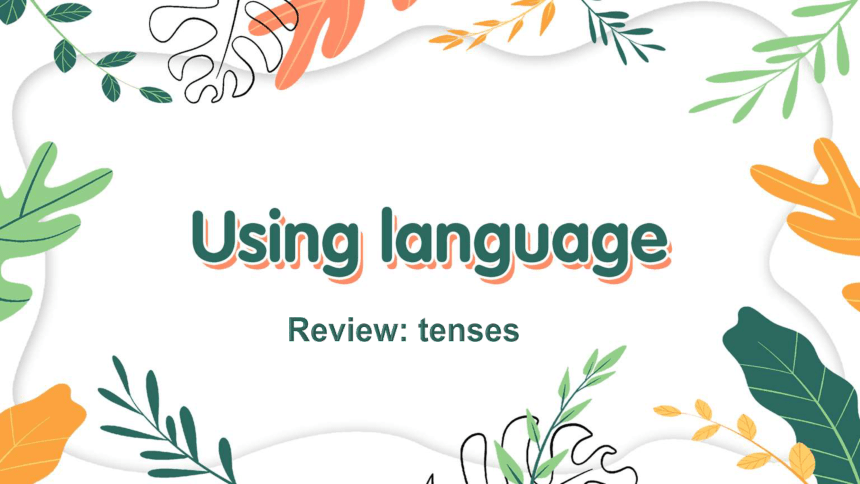
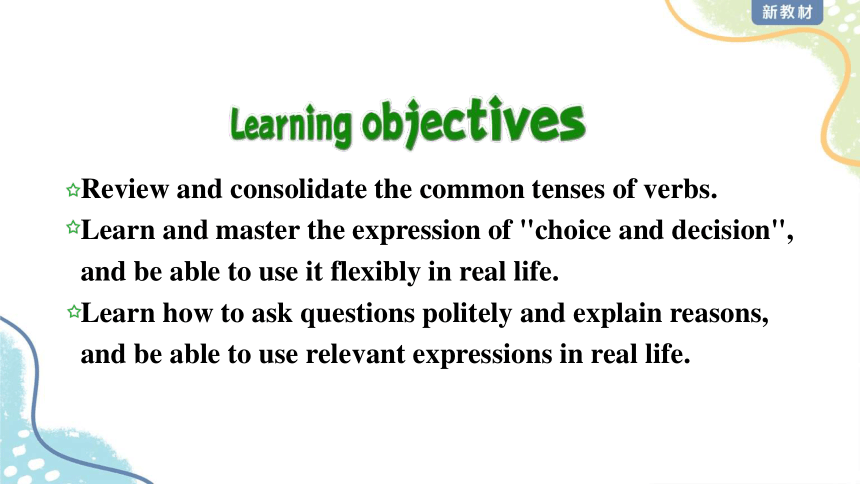
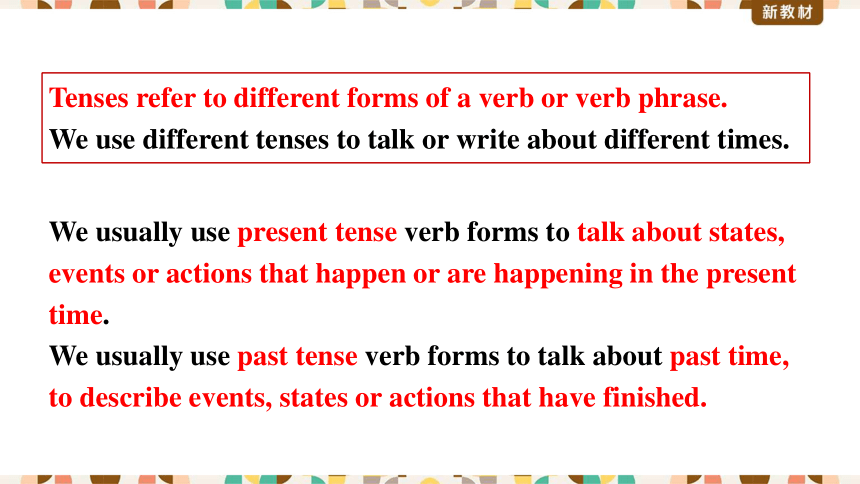
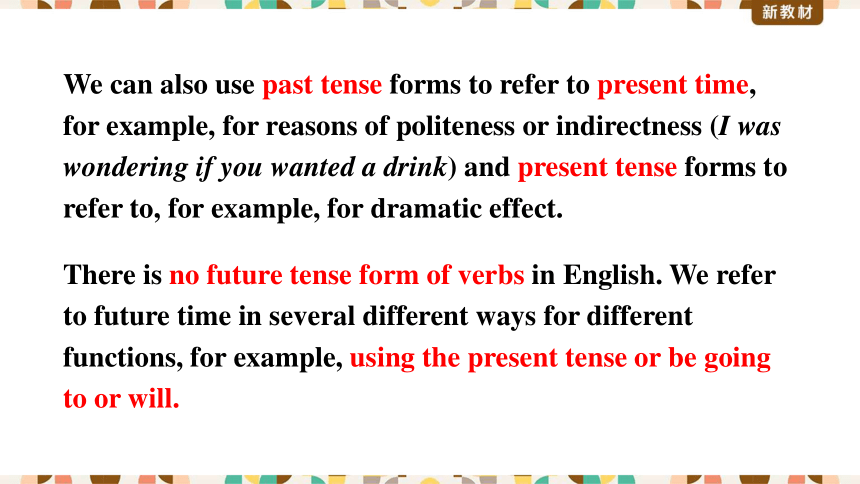
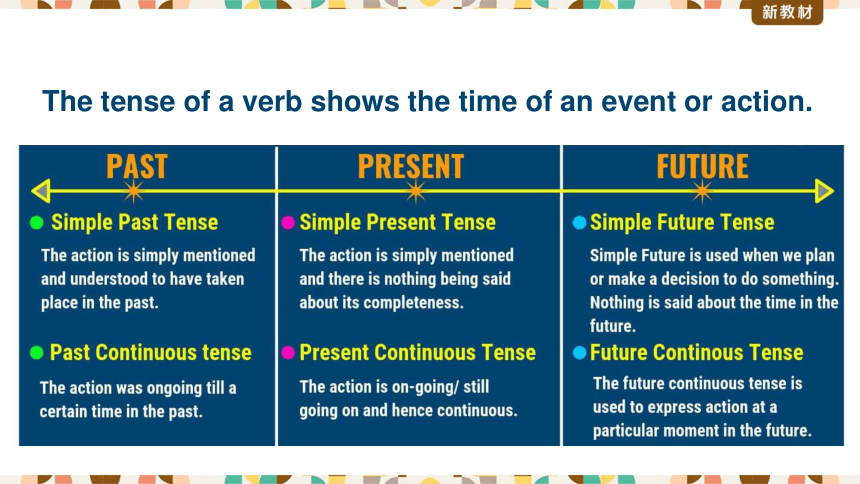

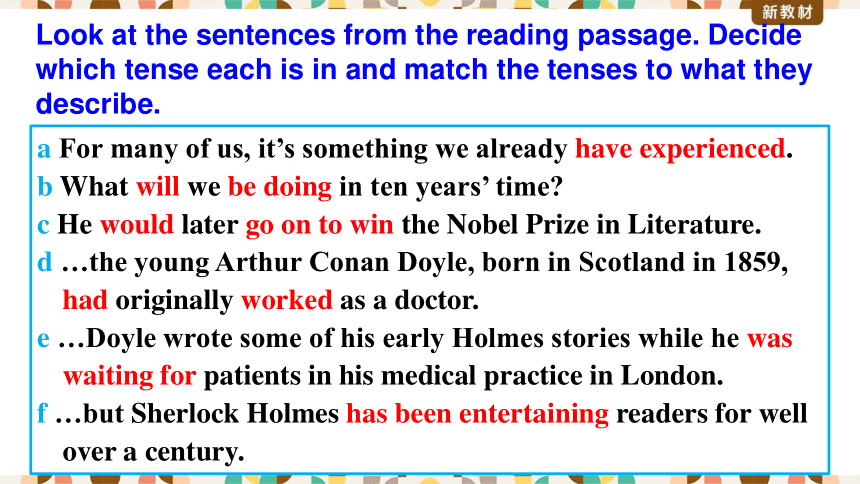
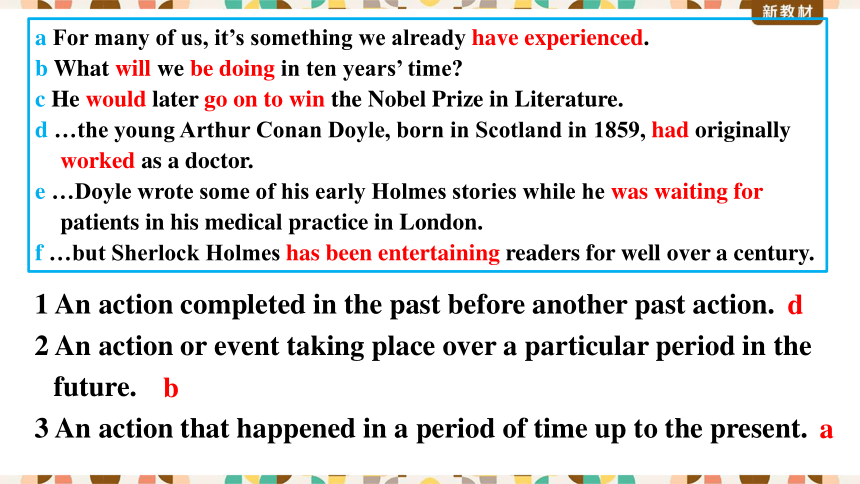

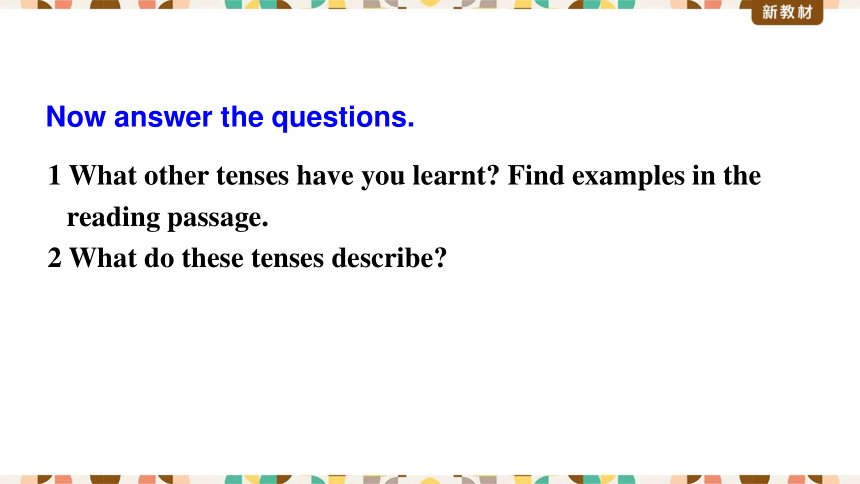
文档简介
(共64张PPT)
Unit 1
Unit 1
Looking forwards
Review: tenses
Review and consolidate the common tenses of verbs.
Learn and master the expression of "choice and decision", and be able to use it flexibly in real life.
Learn how to ask questions politely and explain reasons, and be able to use relevant expressions in real life.
We usually use present tense verb forms to talk about states, events or actions that happen or are happening in the present time.
We usually use past tense verb forms to talk about past time, to describe events, states or actions that have finished.
Tenses refer to different forms of a verb or verb phrase.
We use different tenses to talk or write about different times.
There is no future tense form of verbs in English. We refer to future time in several different ways for different functions, for example, using the present tense or be going to or will.
We can also use past tense forms to refer to present time, for example, for reasons of politeness or indirectness (I was wondering if you wanted a drink) and present tense forms to refer to, for example, for dramatic effect.
The tense of a verb shows the time of an event or action.
Look at the sentences from the reading passage. Decide which tense each is in and match the tenses to what they describe.
a For many of us, it’s something we already have experienced.
b What will we be doing in ten years’ time
c He would later go on to win the Nobel Prize in Literature.
d …the young Arthur Conan Doyle, born in Scotland in 1859, had originally worked as a doctor.
e …Doyle wrote some of his early Holmes stories while he was waiting for patients in his medical practice in London.
f …but Sherlock Holmes has been entertaining readers for well over a century.
1 An action completed in the past before another past action.
2 An action or event taking place over a particular period in the future.
3 An action that happened in a period of time up to the present.
d
a For many of us, it’s something we already have experienced.
b What will we be doing in ten years’ time
c He would later go on to win the Nobel Prize in Literature.
d …the young Arthur Conan Doyle, born in Scotland in 1859, had originally worked as a doctor.
e …Doyle wrote some of his early Holmes stories while he was waiting for patients in his medical practice in London.
f …but Sherlock Holmes has been entertaining readers for well over a century.
b
a
4 An action that started in the past and may still be going on or have just stopped.
5 An intended future action or event as seen from the past.
6 An on-going situation at or around a particular time in the past.
f
c
e
a For many of us, it’s something we already have experienced.
b What will we be doing in ten years’ time
c He would later go on to win the Nobel Prize in Literature.
d …the young Arthur Conan Doyle, born in Scotland in 1859, had originally worked as a doctor.
e …Doyle wrote some of his early Holmes stories while he was waiting for patients in his medical practice in London.
f …but Sherlock Holmes has been entertaining readers for well over a century.
Now answer the questions.
1 What other tenses have you learnt Find examples in the reading passage.
2 What do these tenses describe
Present simple tense
The next, our eyes are open and we find ourselves wondering or even worrying…
Past simple
The American author, Ernest Hemingway, born in 1899, was from early boyhood…
Present continuous tense
One moment, we are lying comfortably in bed…
Simple future tense
Will we get into the school of our choice
Present simple
We use present simple tense to describe:
General truths and facts
Regular and habitual events
Timetables and plans
Instructions and directions
Stories and commentaries
Immediate reactions
I promise, I swear, I agree (speech act verbs)
past simple
We use past simple tense to describe:
We use the past simple to talk about definite time in the past (often we specify when something happened, e.g. yesterday, three weeks ago, last year, when I was young):
definite time in the past
Single or habitual events or states
When we use the past simple to refer to habitual events, the meaning is similar to used to.
Present continuous tense
We use present continuous tense to describe:
Events at the time of speaking
Temporary states
Repeated temporary events
Change
Regular unplanned events
Plans and arrangements
Simple future tense will and shall
We use simple future tense will and shall to describe:
Predictions
Decisions and offers
时态 构成 用法 例句
一般现在时 do/does ① 经常发生的动作或存在的状态。 ② 按计划、规定要发生的动作 ③ 客观存在或普遍真理。 Jim is often late for school.
I go to school every day.
He is a law student.
Mary knows several languages.
The sun rises in the east.
It snows in winter.
时态 构成 用法 例句
一般过去时 did 过去发生的动作或存在的状态。 Tom suddenly fell ill yesterday.
They had a baby last month.
They left for America in 1989.
现在进行时 am/is/are doing 现在正在进行的动作。 What are you doing now, John
George is writing a book these days.
时态 构成 用法 例句
一般将来时 will/ shall do 将来要发生的动作或存在的状态、未来习惯性的动作、提出请求、作出允诺、表示同意等。 Will you be free tomorrow
What shall we do this weekend
It’s going to rain soon.
过去进行时 was/were doing 过去某一时间正在进行的动作。 I was sleeping at 8:00 yesterday evening.
David was having dinner when I called him.
时态 构成 用法 例句
现在完成时 have /has done ① 说话时已经完成的动作,而且这个动作的结果对现在仍有影响。 ② 动作发生在过去,但一直持续到现在,并且有可能继续持续下去。 Jane has already rung me up three times this morning.
Have you ever talked with him about it
Great changes have taken place in my hometown in the past 20 years.
I haven’t seen my sister for ages.
Has he written since he left home
How long has he been ill
时态 构成 用法 例句
过去完成时 had done 在过去某一时刻或动作之前已完成的动作:过去的过去。 By the end of last term, we had learned more than 3,000 English words.
Mary had already gone to work when I rang her up this morning.
时态 构成 用法 例句
现在完成进行时 have/has been doing 过去某时开始一直延续到现在(这个动作可能刚停止, 也可能还在进行), 不少情况下表示与现在状态有联系, 有时表示动作的重复等。 Where have you been We have been looking for you everywhere.
The Chinese have been making paper for two thousand years.
时态 构成 用法 例句
过去将来时 would/ should do 在过去将来的某一时间发生的动作或存在的状态。常用在间接引语中,主句谓语动词为过去时态。 I asked if he would come and repair my TV set.
They were sure that they would succeed.
1. 一般过去时与现在完成时
一般过去时:过去的动作或状态,不涉及对现在的影响;
现在完成时:过去发生的某一动作或存在的状态对现在造成的影响或结果,强调的是现在的状况。
e.g. We talked for hours on the phone.
The ship has sailed for two weeks.
一般过去时:和表示过去的时间状语连用;
现在完成时:常和包括现在时刻在内的时间状语或笼统地表示过去的时间状语连用。
e.g. The flight lasted ten hours and we landed at 6:30 in the morning.
I have been there only once this year.
I have seen his name in the papers rather often recently.
2. 一般过去时与过去完成时
一般过去时:以现在时间为起点,表示过去发生的动作或存在的状态。
过去完成时:以过去某时间为起点,表示过去某一时间或动作之前已经发生或完成的动作或存在的状态。
e.g. She was here a minute ago.
Luke told me that he had met my friends the day before.
一般过去时:表示两个或两个以上的动作,且按照动作发生的顺序表达。
过去完成时:表示某事继续到过去某时已有一段时间时。
e.g. The scientist had a quick lunch and then continued his work.
My uncle had served in the army for ten years; last year he retired.
3. 现在完成时与现在完成进行时
1) 主要差别是现在完成时表示动作已完成,而现在完成进行时却不一定如此。
e.g. They’ve built a bridge. 已建好
They’ve been building a bridge. 可能还在建
2) 许多静态动词只能用于现在完成时不能用于现在完成进行时。
e.g. The strike has lasted six months.
3) 少数动词用这两种时态时意义差别不大。
e.g. He has worked / has been working on Mrs. Green's case for almost six years.
I woke at dawn again and already the birds ______________ (sing). In the coming days, we__________________ (paint) the toilet block that we had been building over the last two months.
I _______________________ (live) in this Cambodian village for two months. Despite the hard physical work, I _________________________ (not regret) for one moment choosing to spend my gap year as a volunteer for the Cambodia Foundation.
Complete the blog with the correct form of the verbs in brackets.
were singing
would be painting
have been living/have lived
don’t regret/haven’t regretted
It is wonderful to meet such friendly local people who are happy to share their lives with us.
I _________(feel) happy and free of worries. And, of course, I _______________________(become) fitter. This gap year has been a fantastic opportunity for my personal growth, and I surely ___________(continue) to learn about how other people live their lives after it ends.
feel
have become/am becoming
will continue
1. The unmanned Chang’e-4 probe (探测器) — the name was inspired by an ancient Chinese moon goddess —________(touch) down last week in the South Pole-Aitken basin.
2. Actually, I ________(start) to learn kung fu when I was seven years old, but I have long been out of practice.
touched
用括号内单词的正确形式填空。
started
3. By about 6000 BC, people ______________ (discover) the best crops to grow and animals to raise.
4. New methods ___________(mean) that fewer people worked in farming.
5. In recent years some Inuit people in Nunavut _____________ (report) increases in bear sightings around human settlements, leading to a …
meant
had discovered
have reported
1. —You are a great swimmer.
—Thanks. It’s because I ________ a lot these days.
A. have been practising B. was practising
C. would practise D. had practised
2. Instead of getting down to a new task as I _________, he examined the previous work again.
A. had expected B. have expected
C. would expect D. expect
A
A
从四个选项中,选出最佳选项。
3. I ______ to send Peter a gift to congratulate him on his marriage, but I couldn’t manage it.
A. had hoped B. am hoping C. have hoped D. would hope
A
4. The musician along with his band members ________ ten performances in the last three months.
A. gives B. has given C. have given D. give
B
5. They are trying to make sure that 5G terminals ________ by 2022 for the Beijing Winter Olympics.
A. will install B. will have been installed
C. are installed D. have been installed
B
Read the profile and talk about David’s life using different tenses where appropriate.
David Mason
PERSONAL INFORMATION
Date of Birth: 20 June 2001
Nationality: British
EDUCATION
2007-2013 Carson Primary School
2013-2019 Wildwood High School
EXTRACURRICULAR EXPERIENCE
Sept 2017 first prize for school science project
Apr-Oct 2018 exchange programme in China
FUTURE PLANS
Julia2019-present gap year in Cambodia
undergraduate study at Newcastle University
chemical engineer after graduation
voluntary work to help people in need
David Mason
David Mason was born on June 20, 2001 in England. He had a very good education. During 2007 and 2013, he studied in Carson Primary School. Then he went to Wildwood High School during 2013 and 2019.
While studying in school, he had many extracurricular experiences, such as the first prize for school science project in Sept 2017, exchange program me in China during Apr 2018 and Oct 2018, gap year in Cambodia during Jul 2019 and present.
After his high school graduation, he wants to do undergraduate study at Newcastle University. He is planning to become a chemical engineer after college and do some voluntary work to help people in need.
Interview each other about your past experience and future plans.
A. Tell me about your experience.
B. Making a meaningful difference in the lives of my patients and their families motivates me to strive for excellence in everything I do. I look forward to seeing their reaction when we get a positive outcome that will change their lives forever. Like the family of a young boy we treated last year—at eight years old, he had experienced rapid weight gain and signs of depression.
His parents described him as a usually joyful child but now he seemed disengaged and uninterested in his typical schedule. In the end, we determined that it was hypothyroidism, which is, of course, controllable with medication. The boy is adjusting well to the treatment and has returned to his joyful self. That’s why I became a nurse and why I’m pursuing a position in pediatrics.”
Read the conversation on page 6. Pay attention to the expressions.
make up my mind
pass up the opportunity
having second thoughts
put off making a decision
reject anything out of hand
weigh up the options
make up my mind
Make my mind up: to decide which of two or more choices you want, especially after thinking for a long time.
pass up the opportunity
pass up a chance /opportunity /offer etc:
to not use the chance etc. to do or have something when it is offered
have second thoughts
have second thoughts: about to start having doubts about a decision you have made
put off making a decision
put off doing something: to delay doing something or to arrange to do something at a later time or date, especially because there is a problem or you do not want to do it now
reject anything out of hand
reject (someone or something) out of hand: to dismiss, deny, or refuse someone or something immediately and without due discussion or consideration.
weigh up the options
to gauge(估算) the potential benefits or downsides of something. A noun or pronoun can be used between "weigh" and "up."
1 What difficult decision is Li Ling facing Why is she feeling worried
She has to make a choice between studying physics at her dream university, as she has been admitted without taking any exam, and taking the college entrance exam and applying to the Medical School there. She can’t make up her mind what the right thing to do is.
Read the conversation and answer the questions.
2 What does Jenny suggest to her
Jenny at first suggested to Li Ling that she should go for her preferred major. Then she suggested that she could put off making a decision until she had spoken to her high school advisor. Since Li Ling still could not make a decision, Jenny suggested that they could go for lunch and then weigh up the options.
3 What would you do when faced with a difficult decision
Read the statements and complete the sentences with the correct form of the expressions.
make up my mind
pass up the opportunity
having second thoughts
put off making a decision
reject anything out of hand
weigh up the options
May: I thought quitting my old job to work here was the right decision to make, but now I’m not sure – the new job seems too demanding.
May is _____________________.
Jane: Can I get back to you by the end of the week I really can’t make a decision now.
Jane is __________________________.
having second thoughts
putting off making a decision
make up my mind
pass up the opportunity
having second thoughts
put off making a decision
reject anything out of hand
weigh up the options
Paul: The physics club or debating society The physics club, of course! I’m a big fan of science.
Bill: Working at my dad’s bank Absolutely not! It’s too boring!
Paul finds it easy to _______________.
make up his mind
Bill is ____________________________.
rejecting something out of hand
make up my mind
pass up the opportunity
having second thoughts
put off making a decision
reject anything out of hand
weigh up the options
Amanda: I need to think about the advantages and disadvantages of each option they’ve offered.
Jia Ying: I’ve decided to say no to the chance to work in Europe.
Amanda wants to ___________________.
weigh up the options
Jia Ying has decided to _____________________.
pass up the opportunity
I. 选用括号内合适的内容完成下面句子。
1. Listen to the two girls by the window. What language __________________ (do they speak, are they speaking)
2. I wonder why Jenny _______________ (doesn't write, hasn't written) to us recently. We should have heard from her by now.
3. She _________ (changed, has changed) her hairstyle in her hometown before she came to Chongqing for a better job.
are they speaking
hasn't written
changed
4. According to the art dealer, the painting ___________ (expects, is expected) to go for at least a million dollars.
5. Susan decided not to work on the program at home because she didn't want her parents to know what she __________ (was doing, has done).
6. He ___________ (has learned, had learned) more than 5,000 English words when he entered the university at the age of 15.
7. Send my regards to your lovely wife when you __________ (phone, will phone) home.
is expected
was doing
had learned
phone
II. 用括号内动词的正确形式完成下面短文。
Three young children are dead after a pickup truck ________ (drive) into the back of an Amish horse-drawn carriage in south Michigan, State Police said.
The children, ages 2, 4 and 6, _______________ (travel) along an Algansee Township road on Friday when the pickup truck rear-ended their carriage, throwing out all of those inside, Michigan State Police said.
drove
were traveling
Some of the other passengers, two adults and two children, 3. were taken to hospitals in Fort Wayne, Indiana, and Kalamazoo,
Michigan, with serious injuries. The driver of the pickup truck, who __________________ (identify) as Tyler Frye, has been arrested, State Police Sgt. Todd Price said. He _________________ (face) three counts of driving while under the influence causing death and two counts of driving while under the influence causing serious injury.
has been identified
is facing / will face
III. 选用括号内合适的内容完成下面短文。
Almost 600 plant species ________________ (have been wiped, have wiped) from the planet in the past 250 years, more than twice the number of bird, mammal and amphibian species that have met the same fate, according to a new study.
The research — published in Nature, Ecology & Evolution
journal — found that 571 plant species ________________ (have disappeared, disappeared) from the wild worldwide, and that plant extinction is occurring up to 500 times faster than the rate it would without human activity.
have been wiped
have disappeared
“Most people can name a mammal or bird that ___________ (becomes, has become) extinct in recent centuries, but few can name an extinct plant,” report co-author Aleys Humphreys said. Plants on islands, in the tropics and in Mediterranean climates ________ (have, had) the highest rates of plant extinction, as these were areas home to unique species vulnerable to human activities. The study said the increase in the plant extinction rate ________ (is, was) possibly due to the loss of habitat of species located in a small geographic area.
has become
had
was
The issue is bigger than plants — the authors said plant extinction had knock-on effects, including on humans. “Plants ________ (will provide, provide) the oxygen we breathe and the food we eat, as well as making up the backbone of the world's ecosystems — so plant extinction is bad news for all species,” co-author Eimear Nic Lughadha said in a statement. “Millions of other species ___________ (depend on, will depend on) plants for their survival, humans included.”
provide
depend on
But there was one positive from the paper: 430 species once considered extinct _____________ (went on, had gone on) to be rediscovered. However, the authors noted that 90% of rediscovered species had a “high extinction risk.”
had gone on
Write at least 6 sentences about your past experience and future plans using different tenses where appropriate.
Unit 1
Unit 1
Looking forwards
Review: tenses
Review and consolidate the common tenses of verbs.
Learn and master the expression of "choice and decision", and be able to use it flexibly in real life.
Learn how to ask questions politely and explain reasons, and be able to use relevant expressions in real life.
We usually use present tense verb forms to talk about states, events or actions that happen or are happening in the present time.
We usually use past tense verb forms to talk about past time, to describe events, states or actions that have finished.
Tenses refer to different forms of a verb or verb phrase.
We use different tenses to talk or write about different times.
There is no future tense form of verbs in English. We refer to future time in several different ways for different functions, for example, using the present tense or be going to or will.
We can also use past tense forms to refer to present time, for example, for reasons of politeness or indirectness (I was wondering if you wanted a drink) and present tense forms to refer to, for example, for dramatic effect.
The tense of a verb shows the time of an event or action.
Look at the sentences from the reading passage. Decide which tense each is in and match the tenses to what they describe.
a For many of us, it’s something we already have experienced.
b What will we be doing in ten years’ time
c He would later go on to win the Nobel Prize in Literature.
d …the young Arthur Conan Doyle, born in Scotland in 1859, had originally worked as a doctor.
e …Doyle wrote some of his early Holmes stories while he was waiting for patients in his medical practice in London.
f …but Sherlock Holmes has been entertaining readers for well over a century.
1 An action completed in the past before another past action.
2 An action or event taking place over a particular period in the future.
3 An action that happened in a period of time up to the present.
d
a For many of us, it’s something we already have experienced.
b What will we be doing in ten years’ time
c He would later go on to win the Nobel Prize in Literature.
d …the young Arthur Conan Doyle, born in Scotland in 1859, had originally worked as a doctor.
e …Doyle wrote some of his early Holmes stories while he was waiting for patients in his medical practice in London.
f …but Sherlock Holmes has been entertaining readers for well over a century.
b
a
4 An action that started in the past and may still be going on or have just stopped.
5 An intended future action or event as seen from the past.
6 An on-going situation at or around a particular time in the past.
f
c
e
a For many of us, it’s something we already have experienced.
b What will we be doing in ten years’ time
c He would later go on to win the Nobel Prize in Literature.
d …the young Arthur Conan Doyle, born in Scotland in 1859, had originally worked as a doctor.
e …Doyle wrote some of his early Holmes stories while he was waiting for patients in his medical practice in London.
f …but Sherlock Holmes has been entertaining readers for well over a century.
Now answer the questions.
1 What other tenses have you learnt Find examples in the reading passage.
2 What do these tenses describe
Present simple tense
The next, our eyes are open and we find ourselves wondering or even worrying…
Past simple
The American author, Ernest Hemingway, born in 1899, was from early boyhood…
Present continuous tense
One moment, we are lying comfortably in bed…
Simple future tense
Will we get into the school of our choice
Present simple
We use present simple tense to describe:
General truths and facts
Regular and habitual events
Timetables and plans
Instructions and directions
Stories and commentaries
Immediate reactions
I promise, I swear, I agree (speech act verbs)
past simple
We use past simple tense to describe:
We use the past simple to talk about definite time in the past (often we specify when something happened, e.g. yesterday, three weeks ago, last year, when I was young):
definite time in the past
Single or habitual events or states
When we use the past simple to refer to habitual events, the meaning is similar to used to.
Present continuous tense
We use present continuous tense to describe:
Events at the time of speaking
Temporary states
Repeated temporary events
Change
Regular unplanned events
Plans and arrangements
Simple future tense will and shall
We use simple future tense will and shall to describe:
Predictions
Decisions and offers
时态 构成 用法 例句
一般现在时 do/does ① 经常发生的动作或存在的状态。 ② 按计划、规定要发生的动作 ③ 客观存在或普遍真理。 Jim is often late for school.
I go to school every day.
He is a law student.
Mary knows several languages.
The sun rises in the east.
It snows in winter.
时态 构成 用法 例句
一般过去时 did 过去发生的动作或存在的状态。 Tom suddenly fell ill yesterday.
They had a baby last month.
They left for America in 1989.
现在进行时 am/is/are doing 现在正在进行的动作。 What are you doing now, John
George is writing a book these days.
时态 构成 用法 例句
一般将来时 will/ shall do 将来要发生的动作或存在的状态、未来习惯性的动作、提出请求、作出允诺、表示同意等。 Will you be free tomorrow
What shall we do this weekend
It’s going to rain soon.
过去进行时 was/were doing 过去某一时间正在进行的动作。 I was sleeping at 8:00 yesterday evening.
David was having dinner when I called him.
时态 构成 用法 例句
现在完成时 have /has done ① 说话时已经完成的动作,而且这个动作的结果对现在仍有影响。 ② 动作发生在过去,但一直持续到现在,并且有可能继续持续下去。 Jane has already rung me up three times this morning.
Have you ever talked with him about it
Great changes have taken place in my hometown in the past 20 years.
I haven’t seen my sister for ages.
Has he written since he left home
How long has he been ill
时态 构成 用法 例句
过去完成时 had done 在过去某一时刻或动作之前已完成的动作:过去的过去。 By the end of last term, we had learned more than 3,000 English words.
Mary had already gone to work when I rang her up this morning.
时态 构成 用法 例句
现在完成进行时 have/has been doing 过去某时开始一直延续到现在(这个动作可能刚停止, 也可能还在进行), 不少情况下表示与现在状态有联系, 有时表示动作的重复等。 Where have you been We have been looking for you everywhere.
The Chinese have been making paper for two thousand years.
时态 构成 用法 例句
过去将来时 would/ should do 在过去将来的某一时间发生的动作或存在的状态。常用在间接引语中,主句谓语动词为过去时态。 I asked if he would come and repair my TV set.
They were sure that they would succeed.
1. 一般过去时与现在完成时
一般过去时:过去的动作或状态,不涉及对现在的影响;
现在完成时:过去发生的某一动作或存在的状态对现在造成的影响或结果,强调的是现在的状况。
e.g. We talked for hours on the phone.
The ship has sailed for two weeks.
一般过去时:和表示过去的时间状语连用;
现在完成时:常和包括现在时刻在内的时间状语或笼统地表示过去的时间状语连用。
e.g. The flight lasted ten hours and we landed at 6:30 in the morning.
I have been there only once this year.
I have seen his name in the papers rather often recently.
2. 一般过去时与过去完成时
一般过去时:以现在时间为起点,表示过去发生的动作或存在的状态。
过去完成时:以过去某时间为起点,表示过去某一时间或动作之前已经发生或完成的动作或存在的状态。
e.g. She was here a minute ago.
Luke told me that he had met my friends the day before.
一般过去时:表示两个或两个以上的动作,且按照动作发生的顺序表达。
过去完成时:表示某事继续到过去某时已有一段时间时。
e.g. The scientist had a quick lunch and then continued his work.
My uncle had served in the army for ten years; last year he retired.
3. 现在完成时与现在完成进行时
1) 主要差别是现在完成时表示动作已完成,而现在完成进行时却不一定如此。
e.g. They’ve built a bridge. 已建好
They’ve been building a bridge. 可能还在建
2) 许多静态动词只能用于现在完成时不能用于现在完成进行时。
e.g. The strike has lasted six months.
3) 少数动词用这两种时态时意义差别不大。
e.g. He has worked / has been working on Mrs. Green's case for almost six years.
I woke at dawn again and already the birds ______________ (sing). In the coming days, we__________________ (paint) the toilet block that we had been building over the last two months.
I _______________________ (live) in this Cambodian village for two months. Despite the hard physical work, I _________________________ (not regret) for one moment choosing to spend my gap year as a volunteer for the Cambodia Foundation.
Complete the blog with the correct form of the verbs in brackets.
were singing
would be painting
have been living/have lived
don’t regret/haven’t regretted
It is wonderful to meet such friendly local people who are happy to share their lives with us.
I _________(feel) happy and free of worries. And, of course, I _______________________(become) fitter. This gap year has been a fantastic opportunity for my personal growth, and I surely ___________(continue) to learn about how other people live their lives after it ends.
feel
have become/am becoming
will continue
1. The unmanned Chang’e-4 probe (探测器) — the name was inspired by an ancient Chinese moon goddess —________(touch) down last week in the South Pole-Aitken basin.
2. Actually, I ________(start) to learn kung fu when I was seven years old, but I have long been out of practice.
touched
用括号内单词的正确形式填空。
started
3. By about 6000 BC, people ______________ (discover) the best crops to grow and animals to raise.
4. New methods ___________(mean) that fewer people worked in farming.
5. In recent years some Inuit people in Nunavut _____________ (report) increases in bear sightings around human settlements, leading to a …
meant
had discovered
have reported
1. —You are a great swimmer.
—Thanks. It’s because I ________ a lot these days.
A. have been practising B. was practising
C. would practise D. had practised
2. Instead of getting down to a new task as I _________, he examined the previous work again.
A. had expected B. have expected
C. would expect D. expect
A
A
从四个选项中,选出最佳选项。
3. I ______ to send Peter a gift to congratulate him on his marriage, but I couldn’t manage it.
A. had hoped B. am hoping C. have hoped D. would hope
A
4. The musician along with his band members ________ ten performances in the last three months.
A. gives B. has given C. have given D. give
B
5. They are trying to make sure that 5G terminals ________ by 2022 for the Beijing Winter Olympics.
A. will install B. will have been installed
C. are installed D. have been installed
B
Read the profile and talk about David’s life using different tenses where appropriate.
David Mason
PERSONAL INFORMATION
Date of Birth: 20 June 2001
Nationality: British
EDUCATION
2007-2013 Carson Primary School
2013-2019 Wildwood High School
EXTRACURRICULAR EXPERIENCE
Sept 2017 first prize for school science project
Apr-Oct 2018 exchange programme in China
FUTURE PLANS
Julia2019-present gap year in Cambodia
undergraduate study at Newcastle University
chemical engineer after graduation
voluntary work to help people in need
David Mason
David Mason was born on June 20, 2001 in England. He had a very good education. During 2007 and 2013, he studied in Carson Primary School. Then he went to Wildwood High School during 2013 and 2019.
While studying in school, he had many extracurricular experiences, such as the first prize for school science project in Sept 2017, exchange program me in China during Apr 2018 and Oct 2018, gap year in Cambodia during Jul 2019 and present.
After his high school graduation, he wants to do undergraduate study at Newcastle University. He is planning to become a chemical engineer after college and do some voluntary work to help people in need.
Interview each other about your past experience and future plans.
A. Tell me about your experience.
B. Making a meaningful difference in the lives of my patients and their families motivates me to strive for excellence in everything I do. I look forward to seeing their reaction when we get a positive outcome that will change their lives forever. Like the family of a young boy we treated last year—at eight years old, he had experienced rapid weight gain and signs of depression.
His parents described him as a usually joyful child but now he seemed disengaged and uninterested in his typical schedule. In the end, we determined that it was hypothyroidism, which is, of course, controllable with medication. The boy is adjusting well to the treatment and has returned to his joyful self. That’s why I became a nurse and why I’m pursuing a position in pediatrics.”
Read the conversation on page 6. Pay attention to the expressions.
make up my mind
pass up the opportunity
having second thoughts
put off making a decision
reject anything out of hand
weigh up the options
make up my mind
Make my mind up: to decide which of two or more choices you want, especially after thinking for a long time.
pass up the opportunity
pass up a chance /opportunity /offer etc:
to not use the chance etc. to do or have something when it is offered
have second thoughts
have second thoughts: about to start having doubts about a decision you have made
put off making a decision
put off doing something: to delay doing something or to arrange to do something at a later time or date, especially because there is a problem or you do not want to do it now
reject anything out of hand
reject (someone or something) out of hand: to dismiss, deny, or refuse someone or something immediately and without due discussion or consideration.
weigh up the options
to gauge(估算) the potential benefits or downsides of something. A noun or pronoun can be used between "weigh" and "up."
1 What difficult decision is Li Ling facing Why is she feeling worried
She has to make a choice between studying physics at her dream university, as she has been admitted without taking any exam, and taking the college entrance exam and applying to the Medical School there. She can’t make up her mind what the right thing to do is.
Read the conversation and answer the questions.
2 What does Jenny suggest to her
Jenny at first suggested to Li Ling that she should go for her preferred major. Then she suggested that she could put off making a decision until she had spoken to her high school advisor. Since Li Ling still could not make a decision, Jenny suggested that they could go for lunch and then weigh up the options.
3 What would you do when faced with a difficult decision
Read the statements and complete the sentences with the correct form of the expressions.
make up my mind
pass up the opportunity
having second thoughts
put off making a decision
reject anything out of hand
weigh up the options
May: I thought quitting my old job to work here was the right decision to make, but now I’m not sure – the new job seems too demanding.
May is _____________________.
Jane: Can I get back to you by the end of the week I really can’t make a decision now.
Jane is __________________________.
having second thoughts
putting off making a decision
make up my mind
pass up the opportunity
having second thoughts
put off making a decision
reject anything out of hand
weigh up the options
Paul: The physics club or debating society The physics club, of course! I’m a big fan of science.
Bill: Working at my dad’s bank Absolutely not! It’s too boring!
Paul finds it easy to _______________.
make up his mind
Bill is ____________________________.
rejecting something out of hand
make up my mind
pass up the opportunity
having second thoughts
put off making a decision
reject anything out of hand
weigh up the options
Amanda: I need to think about the advantages and disadvantages of each option they’ve offered.
Jia Ying: I’ve decided to say no to the chance to work in Europe.
Amanda wants to ___________________.
weigh up the options
Jia Ying has decided to _____________________.
pass up the opportunity
I. 选用括号内合适的内容完成下面句子。
1. Listen to the two girls by the window. What language __________________ (do they speak, are they speaking)
2. I wonder why Jenny _______________ (doesn't write, hasn't written) to us recently. We should have heard from her by now.
3. She _________ (changed, has changed) her hairstyle in her hometown before she came to Chongqing for a better job.
are they speaking
hasn't written
changed
4. According to the art dealer, the painting ___________ (expects, is expected) to go for at least a million dollars.
5. Susan decided not to work on the program at home because she didn't want her parents to know what she __________ (was doing, has done).
6. He ___________ (has learned, had learned) more than 5,000 English words when he entered the university at the age of 15.
7. Send my regards to your lovely wife when you __________ (phone, will phone) home.
is expected
was doing
had learned
phone
II. 用括号内动词的正确形式完成下面短文。
Three young children are dead after a pickup truck ________ (drive) into the back of an Amish horse-drawn carriage in south Michigan, State Police said.
The children, ages 2, 4 and 6, _______________ (travel) along an Algansee Township road on Friday when the pickup truck rear-ended their carriage, throwing out all of those inside, Michigan State Police said.
drove
were traveling
Some of the other passengers, two adults and two children, 3. were taken to hospitals in Fort Wayne, Indiana, and Kalamazoo,
Michigan, with serious injuries. The driver of the pickup truck, who __________________ (identify) as Tyler Frye, has been arrested, State Police Sgt. Todd Price said. He _________________ (face) three counts of driving while under the influence causing death and two counts of driving while under the influence causing serious injury.
has been identified
is facing / will face
III. 选用括号内合适的内容完成下面短文。
Almost 600 plant species ________________ (have been wiped, have wiped) from the planet in the past 250 years, more than twice the number of bird, mammal and amphibian species that have met the same fate, according to a new study.
The research — published in Nature, Ecology & Evolution
journal — found that 571 plant species ________________ (have disappeared, disappeared) from the wild worldwide, and that plant extinction is occurring up to 500 times faster than the rate it would without human activity.
have been wiped
have disappeared
“Most people can name a mammal or bird that ___________ (becomes, has become) extinct in recent centuries, but few can name an extinct plant,” report co-author Aleys Humphreys said. Plants on islands, in the tropics and in Mediterranean climates ________ (have, had) the highest rates of plant extinction, as these were areas home to unique species vulnerable to human activities. The study said the increase in the plant extinction rate ________ (is, was) possibly due to the loss of habitat of species located in a small geographic area.
has become
had
was
The issue is bigger than plants — the authors said plant extinction had knock-on effects, including on humans. “Plants ________ (will provide, provide) the oxygen we breathe and the food we eat, as well as making up the backbone of the world's ecosystems — so plant extinction is bad news for all species,” co-author Eimear Nic Lughadha said in a statement. “Millions of other species ___________ (depend on, will depend on) plants for their survival, humans included.”
provide
depend on
But there was one positive from the paper: 430 species once considered extinct _____________ (went on, had gone on) to be rediscovered. However, the authors noted that 90% of rediscovered species had a “high extinction risk.”
had gone on
Write at least 6 sentences about your past experience and future plans using different tenses where appropriate.
